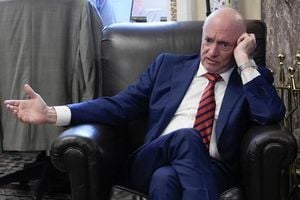Big changes might be looming for the U.S. educational system as President-elect Donald Trump signals plans to eliminate the U.S. Department of Education. This ambitious promise, made during his campaign, has raised eyebrows and sparked intense debate over its potential impacts on public education across the country. Since the department's establishment in 1979, it has played pivotal roles, especially for low-income and special needs students, providing billions of dollars annually to support educational programs.
During his campaign, Trump famously declared on FOX News, "We're going to take the Department of Education - close it. I'm going to close it," affirming his long-standing view against federal control over education. This sentiment resonates with many Republicans who argue for shifting education control back to the states. For them, the notion of local school boards and state Departments of Education making decisions rather than what they call "unelected bureaucrats" is appealing.
Senator Mike Rounds, a South Dakota Republican, recently introduced legislation, dubbed the Returning Education to Our States Act, advocating for the dissolution of the Education Department. This bill aligns with Trump’s promise, aiming to redistribute the department’s functions to other federal agencies. Rounds stated, "Local control is best when itcomes to education," emphasizing the need to empower local governance.
Despite this push, experts caution about the challenges and repercussions of dismantling the department. Critics argue it might severely harm public schools. The Department of Education, even though it only accounts for about 4% of the total federal budget, provides significant funding for educational initiatives, particularly those aimed at assisting low-income districts and students with disabilities. For example, Michigan schools alone receive about 15% of their funding from the Department, which is integral for services catering to students with special needs.
Thomas Morgan, from the Michigan Education Association, voiced concerns over the potential elimination, stating, "One of the most important things the Department of Education does is provide support for special education to help students with special needs." He expressed worry about how schools could maintain equitable funding for vulnerable populations without federal assistance, especially those located in both urban and rural areas where resources are already limited.
Implementation of such sweeping changes could lead schools to tighten their budgets, seeking alternative funding sources. Educators fear these financial constraints might impact not only special education programs but also services like school meals—essential for many children. Morgan remarked, "No child can learn if their stomach is grumbling," underscoring the importance of consistent nutrition for students.
Another concern is the proposed recommendations from Project 2025, drafted by the Heritage Foundation. This policy blueprint, advocated by Trump’s transition team, hints at reducing school meal funding and reallocatively increasing public funds for private and charter schools. Critics like Morgan argue this would siphon much-needed resources away from public schools, particularly detrimental for rural areas without viable alternatives to public education.
Despite the push from Trump and some Republican lawmakers, the path to actually abolishing the Department of Education is fraught with political hurdles. Experts speculate even with Republican control of Congress, obtaining the 60 Senate votes necessary to completely eliminate the agency poses significant challenges. The previous unsuccessful amendment to shutter the department, which failed with 60 Republicans joining all Democrats against it, highlights the uphill battle proponents face.
Even if Trump succeeds at disbanding the agency, questions loom about the redistribution of its responsibilities. Hess, the director of education policy studies at the American Enterprise Institute, suggested civil rights enforcement could be transferred to the Department of Justice, and the Treasury Department might take over managing student loans. "Some of the Department of Education's core responsibilities could be managed more effectively by other federal agencies," he argued.
While discussions focus on the potential for abolition, the core financial underpinnings of federal support for education are likely to remain, as experts suggest these funds are too popular to erase entirely. "Most schools get about 10% of their funding from the federal government; it’s not going away anytime soon," asserted Dr. Marguerite Roza, director of Georgetown University’s Edunomics Lab.
Supporters of the elimination argue it could streamline decision-making and reduce bureaucracy, proposing instead federal education dollars could follow the student—potentially to private institutions, as suggested by Trump's comment on prioritizing student choice. Critics, including Kim Anderson from the National Education Association, worry this feeds a larger agenda to privatize public education, enabling wealthier families to escape public school systems.
Simply put, the fate of the Department of Education teeters between ideological fervor for local control and pragmatic concerns for the educational welfare of millions of students. While the rhetoric is fiery, the realities on the ground remind lawmakers of the delicate balance educators and advocates must navigate—qualities of education threaten to plummet if these educational lifelines are cut.
Overall, as the transition inches forward, the echoes of Trump’s educational promises continue to resonate, urging all stakeholders—parents, students, and educators—to remain vigilant about the possible transformations to come. The commitments made today set the tone for future generations of American students, and only time will tell what changes could come to shape their educational paths.



